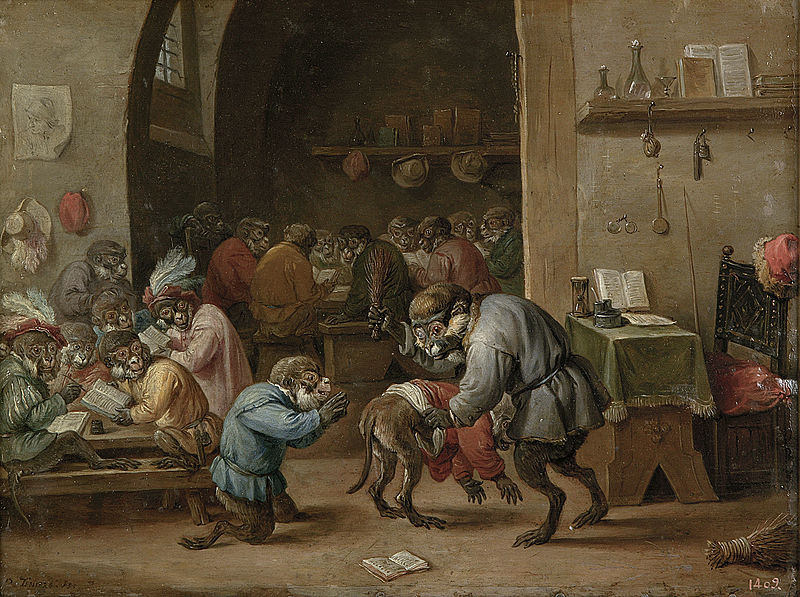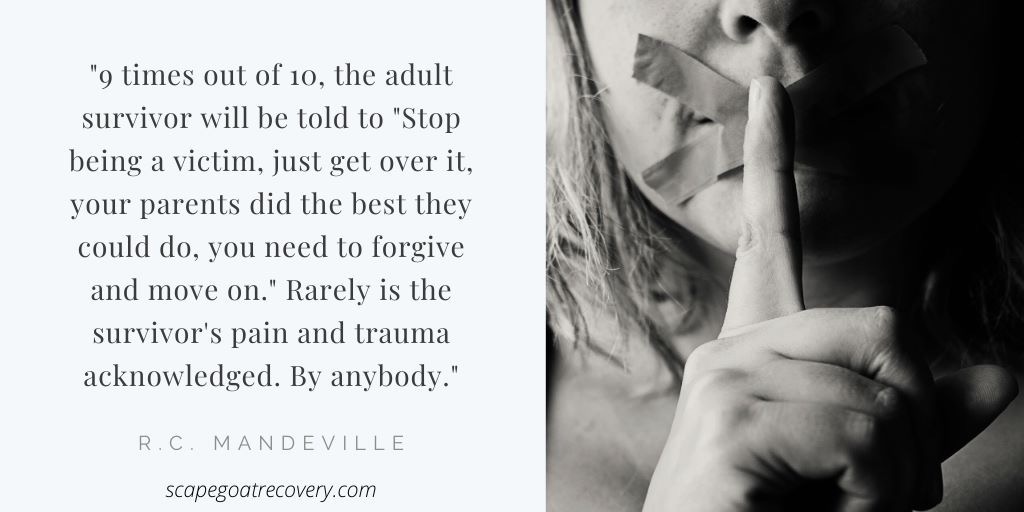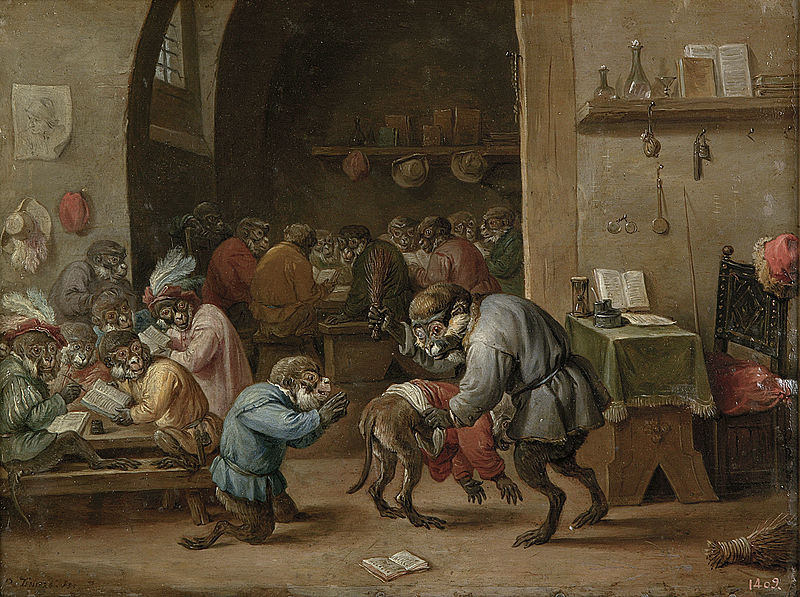Thieves in the Temple: The Importance of Identifying Scapegoating in Family Systems

There can be thieves in the temple, who will tell you they are only there to polish the floors.
In this current age, we have witnessed an incredible expansion on our knowledge of not only how many, if not the majority, of our most troubling psychological illnesses being secondary to developmental and/or perinatal trauma, but also how many physical illnesses can be attributed to such trauma too. However, there is one very common type of relational trauma which does not seem to be gaining the academic attention it warrants, as from what I have witnessed in my practice, it results in the highest degree of psychological pain with far-reaching consequences across the lifespan. This is in victims of family scapegoating.
What is Family Scapegoating?
The term ‘scapegoat’ is an old biblical concept that describes the archetypal symbolism of being laden with the sins of others and being outcast into the wilderness alone. This was a ritual performed in ancient Hebraic tribes, where an actual goat would be released into the wild in an attempt to symbolically atone the tribe of all wrong doings.
In family systems theory, this term has been coined to describe instances where a family member gets blamed for having a psychological problem that is deemed to upset the whole family and is isolated for it, but where they are not actually the one disturbing the peace. In most instances it is a child who is assigned this role, becoming the proverbial black sheep. Yet as aforementioned, it is confoundingly not this particular family member who is to blame. They have had that blame projected onto them, so as to screen from everyone’s awareness the individual(s) who are demonstrating the severest of dysfunction within the family unit. This role is very isolating and has the individual either retreat deep within themselves while being surrounded by unempathetic family members or being ostracized and forced to eventually flee the family system as a form of taking the sins of the tribe out of the family’s awareness.
At the heart of this dynamic it is usually a parent, with a narcissistic character structure, who because of attachment traumas stemming from their own childhood, has issues with relating and/or unconsciously needs a target for repressed feelings of resentment and disappointment to be expressed on to. This type of parent seems unconsciously motivated to create a “problem child” to disguise from the family’s attention their own dysfunction, and inability to fulfil their children’s needs emotionally. There are other possible motivators, such as a parent needing to justify addictive behaviours. Generally speaking though, the target for this abuse is often the most sensitive child, the one who tends to become upset by perceived injustice, and essentially holds a mirror up to manipulative or hostile behaviour with their emotional reactions.
I have also seen that birth order and gender can be a factor which determines which child is most vulnerable for this type of abuse.
The Far-Reaching Impact of this Type of Trauma
Most bewilderingly for the one assigned that role, is that the whole family falls under the spell of believing this individual to be a real nuisance to everyone, especially for the seemingly fragile scapegoating parent. And now keeping in mind that the scapegoating parent is not adequately equipped to fulfil the emotional needs of any of his/her children, the scapegoat’s siblings can then subliminally feel that the sole reason they are not getting their emotional needs met is because of the demands the scapegoat is putting on the parent, thus adopting a higher degree of hostility towards their scapegoated sibling.
The other parent in such a system, usually has taken on a caretaking role with this type of partner—doing their best to keep an immature, self-absorbed spouse, happy—and thus developing the attitude that if it wasn’t for that one kid, things would be easier in the home, and in the marriage, thus enabling their spouse to mistreat their child, and thus mistreating the scapegoated child as well. And so, the family scapegoat will grow up in an atmosphere of belligerence, disrespect and a kind of tribal hostility. There is usually little or no empathy within this family system for the scapegoat. As a consequence, the scapegoat will grow up believing they are a real annoyance to everyone, and because it is so hard for a child, to recognise their worth in such an environment, they will come to believe they deserve this treatment.
But beyond this hostility there is a whole other level of manipulation that takes place on top of this. Usually the scapegoating parental figure will treat the child in such a way, that the child will begin acting out, being triggered to big emotional displays to fulfil the projection that has been assigned her (this is known as projection identification). The parent instinctually knows their child’s weak spots—be it loud noises, touch, or teasing about their physical features—and so can masterfully trigger the child to ensure the child fulfils the projection of being the trouble-maker.
One client described feeling like she was constantly under her mother’s critical gaze, as it seemed she was always looking for an opportunity to physically restrain her. This was a big trigger for my client who hated touch, perhaps as a reaction to early attachment issues (my sense is that the scapegoat is often handled badly even as an infant). Her mother would regularly hold her tightly and wrap her in a blanket, as some strange disciplinary measure, this would always cause my client to become most upset and distressed. When she couldn’t stand having the negative attention upon her and being physically handled this way she would often run away, as much to get some space, but with desperate feelings that she needed to be out of the family. However, each time when she was eventually found, often by police, she would be taken home and receive a severe beating from her father, and then her entire family would not talk to her for a few days, communicating to her that she had been to blame for the whole event.
By the time the scapegoated individual has entered adolescence they will have an inexplicably painful inner-world, filled with intense confused emotions and toxic shame to have to manage. Their lives may become quite chaotic and their emotions unstable. You can see quite obviously why this often leads to substance abuse, self-harming and difficulties in relating to others. But sadly, these struggles will then serve to fortify the family myth of them really being the family screw-up.
Such is the nature of this psychological abuse and deception that the scapegoat usually comes to identify with the negative image projected onto them, not realising the hoax that has been played on them. Sadly, even if they can recognise the injustice and abuse they have been subjected to, they will not get any validation from the entranced family. If they were to try and present a backlog of concrete evidence, they will only be gaslit or again blamed for being a troublemaker. “Why are you always bringing up the past?”
Furthermore, they are often prone to moving towards relationships throughout their whole lives (often to narcissistic personalities) where the confusing incongruency of someone saying they care for them, and demonstrating in reality that they really do not, will be an awful potentially life-threatening riddle for them to solve. They will also often experience scapegoating in other groups, such as in the workplace, and at school, causing trauma after trauma.
The hostility within these families can occur at such varied levels, from criminally sadistic, to being quite covert and interspersed with some genuine loving warmth. In any case, these individuals show up to my practice at alarming rates, and from the most divergent cultural backgrounds. Besides the countless Australian clients, I have worked with Middle-Eastern, African, Asian and Indian family scapegoats, so it seems to be a dynamic present in family systems regardless of culture or class.
When these clients first begin therapy with me, I see them being in a sort of trance of introjected hostility from the family towards the self. The most common issues they describe are anxiety, low self-esteem, abusive friendships/relationships, ADD/ADHD and addictive behaviours. They describe feeling toxic shame and experiencing crippling self-doubt.
It is my firm belief that the therapist’s job is to help these individuals break out of that self-loathing mindset through some delicate analytical work that acknowledges the experience of this abuse, and then grounding them in a more accurate depiction of themselves. Too often though there has been a tendency—particularly within the behavioural therapies—that the family system is not even investigated, and so the client gets a diagnosis (such as generalised anxiety disorder, borderline personality disorder or substance abuse disorder) and yet another message of being the one with problem. So often scapegoated children get taken into a therapy office and the child specialist does not identify the scapegoating happening to the child. This tendency might reflect a cultural taboo around holding a mirror up to pathological parents and families.
Furthermore, I feel that this type of abuse is getting very little attention in academic psychology, which may reflect a collective scapegoating that is inherent within the literature towards these individuals. As nowhere have I seen so much victim-blaming then with this type of trauma, having read many articles describing how adult survivors of scapegoating seem to behave in ways that attract more scapegoating. And while this may be partly true—due to the weaker boundaries, and people-pleasing tendencies —I do not believe this is a really fair assessment on the dynamic, especially since such traits of being an over-sharer, or going out of your way to be liked, are hardly anti-social qualities, and do not justify the type of hostile responses from groups I constantly hear about.

Given the countless cases and ways I have heard such individuals get scapegoated, first in their families and then in other groups, it appears to me, that much like a child becomes vulnerable for being targeted in their family, is for having a greater sense of injustice, and higher capacity for empathy, it seems too what leads most often to the perpetuation of scapegoating, is similarly due to a higher emotional IQ, which in any dysfunctional groups will lead power-holders to need to isolate and silence the noble-hearted ones who by their very presence can be holding up a mirror to bad behaviour and projecting within the group, silently or passionately, a demand for more ethical behaviour. What has struck me so much about working with these individuals, is that they have a very strong sense of the most ethical ways of relating to others, and what constitutes for healthy authority. It is this that I feel more than anything leads to them being targeted in other groups.
Collectively the victims of family scapegoating may be prone to being further scapegoated within society and by mental heath professionals, due to the fact these individuals have suffered the unthinkable from the very people that brought them into the world. Perhaps as a civilization we would prefer not to be aware of such atrocities. It used to be this way for victims of child sexual abuse for similar reasons.
And on that grave note, a family scapegoat is far more vulnerable than a child from a loving family to be preyed upon by paedophiles. Frequently I hear from clients that they have experienced both types of abuse, often within the same family.
The Importance of Recognising this Trauma in the Therapeutic Encounter
So whenever I have a client presenting with high-anxiety, a strong sense of self-loathing and self-destructive behaviours, problems with concentration or relationship patterns, I hold as a working hypothesis that being scapegoated is one possible reason for their psychological suffering. But it is a fine art to be sure. I feel at times this sort of analytical work has jeopardised the therapeutic alliance by my underestimating a client’s need to hold onto an idealised image of the family for their sense of security and belonging.
Yet the most momentous break-throughs come when such an individual realises that they should not feel so bad about themselves, and they have been manipulated into feeling that way because of insecure parents and authority figures. A mantra I sometimes give victims of family scapegoating is, “I’ve been right all along and even when I was wrong (made mistakes) it was for the right reasons”. This I believe becomes the key way to curb any feelings of disempowerment and victimhood. The family scapegoat is actually the only individual within the family system that can escape the dysfunction, and therefore stands a better chance for self-actualising, and possibly self-realising, once they have healed their injured instincts.
The Gifts of the Scapegoat
Furthermore, what seems to hold true for the scapegoated individual that I like to emphasise for my clients, is that they are usually a very sane and gifted individual. Having had to essentially raise themselves amongst a tribe of naysayers, has usually developed them into a highly resourced, and very gifted individual in a range of areas. These individuals tend to raise themselves through the collective unconscious, or zeitgeist of the era, devouring books, music and art to help nurture them, and thereby developing them into highly evolved, progressive individuals. And most miraculously for all the hostility they have suffered they are usually such very empathetic individuals who make for excellent parents and romantic partners.
The scapegoat archetype is perfectly captured by the figure of Chiron in Greek mythology. Chiron was rejected by his mother at birth and then through his own lonely search for healing, he eventually becomes a respected teacher for the heroes of the Greek saga, such as Achilles and Hercules. The Greek myth of Chiron perfectly symbolises how the family scapegoat often goes on to become the wounded healer, and/or a teacher in their vocation, having a lot to offer society, due to the wisdom gained from such a painful journey and hard-fought for healing and deep inner-transformation, that is required when you are met with the inexplicable pain of having your own family abuse and reject you.
The Therapeutic Model I Propose for Working with Victims of Family Scapegoating
The therapeutic work I believe is most useful, centres around supporting such individuals through a very intense individuation process, breaking them out of the trance of self-loathing with analytical work, and helping them identify their talents. There is usually a strong need for them to build stronger boundaries with friends and family members (surviving family affairs with a fun little game I like to call “I’m the sanest person in the room”), forgiving their mistakes and blunders from the past with the self-compassion afforded by understanding why they may have felt so out of control, and stumbled so often.
In my opinion there is a tremendous need to do process-oriented work which helps release the bound up internalised hostility from the nervous system. Therapies like Holotropic Breathwork, somatic psychotherapy and the psycho-sensory therapies such as EMDR, are the best tools I have found to support this process. Often these individuals have a lot of destructive energy to release, as well as grounding and core strength to develop, so I often recommend aggressive team sports, yoga and cardio fitness classes to perform outside of the sessions. For clients presenting with problems of addictions, I always encourage them to engage in 12-step recovery programs (such as Narcotics Anonymous) in conjunction with psychotherapy.
Then I suggest they really go after what they want in life, helping them identify how they can learn to live unapologetically true to themselves, honing their many gifts and becoming more expert at getting their needs met in their environment.
There are such varying degrees of nastiness involved in these cases. But particularly in instances where there has been ongoing abuse, and relentless hostility, a client might eventually opt for ‘no contact’ with their family. This decision requires the highest level of therapeutic support as the grief, alienation and feeling of betrayal can be most overwhelming.
At a certain point it might be really important for scapegoat victims in their healing process to understand that no ones to blame for this dynamic. And that this type of cruelty has been passed on from generation to generation, as an inherited trauma.
It is of course not always so straightforward working with someone with so much relational trauma given how difficult it might be to gain the trust of the client. But I would fervently argue that it is of great ethical imperative for psychotherapists to help a client explore their symptoms first from the perspective that they may represent a sane reaction to an insane family or societal environment. Because otherwise there will be some element of that individual being scapegoated within the therapeutic encounter, which has happened so often within many of the current psychotherapeutic frameworks of this age. For there really are individuals who for all their suffering and difficulties in relationships and in groups, deserve to learn that they are in fact, not the one with the problem.
